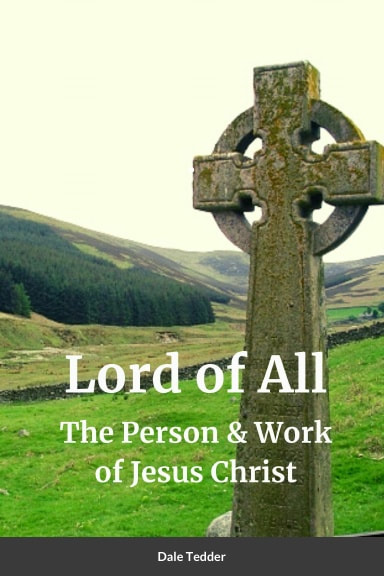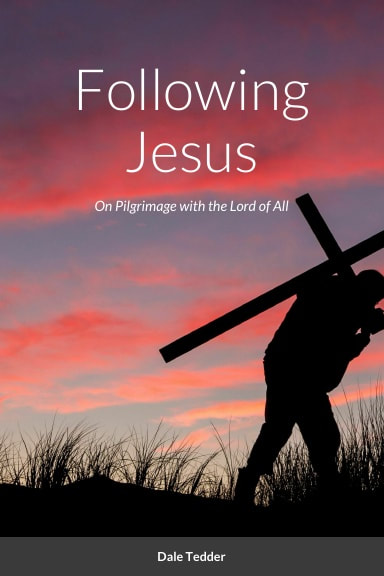CLICK HERE to listen to this week's devotional on the Walking Points Podcast, or listen to it on your favorite podcast platform. There's always extra content on the audio version that I pray will bless you. Matthew 28:18 – And Jesus came and said to them, “All authority in heaven and on earth has been given to me. Compartmentalized Living Won’t Do I remember when I first started using the phrase, “faith for every sphere of life.” It began as I started studying the Lordship of Jesus Christ. It just made sense that if Jesus Christ is Lord of heaven and earth, then he is Lord of everything. And if he is the Lord of all there is, then I must submit to him in every sphere of my life, or else I should stop calling him Lord. Jesus said as much in Luke 6:46, Why do you call me ‘Lord, Lord,’ and do not do what I tell you? (NRSV) This notion is in marked contrast to the way many people think and live, including myself in the early days of my faith. I, like plenty of others, had long been an adherent of a compartmentalized faith. Men, you especially know the drill: the Christian faith is fine for Sunday mornings, but it has nothing to do with the rest of your life. It’s shameful to admit, but that’s where I was. Personal, Not Private Instead, the Christian faith should be understood as a comprehensive view of life. The secular world around us, however, still prefers the church to remain silent about anything not having to do with personal prayers and worship on Sunday mornings. Faith, they say, is private. Sure, you can practice it at home, or even with other Christians on Sunday mornings, but don’t dare bring it into the public square. Jesus, however, doesn’t give us that option. The Christian faith certainly ought to be personal, but it should never be private. To paraphrase the Dutch theologian and statesman, Abraham Kuyper, “there is not a square inch in all the universe about which the Lord Jesus Christ does not declare his own.” As a Methodist, I have rejoiced that John Wesley took just such a view of the Christian faith. He called it Scriptural Holiness and said it was his purpose in life to spread such Scriptural Holiness over the land. For Wesley, holiness was inward but also outward. It was personal and it was social. There was no picking and choosing. Faith must permeate every aspect of a Christian’s life – prayer, personal devotions, worship, marriage, parenting, work, economics, politics, education, the arts, personal morality, relationships, civic duty, and serving the community, just to name a few spheres of life. This Includes Your Life I encourage you to prayerfully ask yourself what it would mean for you to understand there is not even the smallest corner of your life about which Jesus Christ, as Lord, is unconcerned. How would acknowledging and submitting to that truth change your life? How would it bless your relationship with your family and friends? What consequences would it have for you in your workplace? Can you imagine the possibilities? Christ is calling you to follow him in every sphere of your lives. Do you hear his voice? Will you follow him? Walking Points
Prayer
0 Comments
CLICK HERE to listen to this week's devotional on the Walking Points Podcast, or listen to it on your favorite podcast platform. There's always extra content on the audio version that I pray will bless you. Luke 13:20-21 - And again he said, “To what shall I compare the kingdom of God? 21 It is like leaven that a woman took and hid in three measures of flour, until it was all leavened.” A Definition A Kingdom Disciple is a follower of the Lord Jesus Christ. The phrase, Kingdom Disciple, is my shorthand way of communicating what it means to live faithfully as Christ’s follower, under his Lordship, and for his Kingdom. This distinctive is not mine. It’s neither innovative nor original. However, my goal in emphasizing Kingdom Discipleship is to help men see more fully what God has revealed in and through his Word about following Christ. Jesus Christ is Lord By using the phrase, Kingdom Discipleship, I wish to remind disciples of Jesus Christ that our calling is to faithfully and obediently follow Christ in every sphere of life. This is imperative because Jesus Christ is Lord over every sphere of life. It was God who granted Jesus authority over heaven and earth (Matt. 28:18) and gave him the name above every name (Phil. 2:9). It would, therefore, run counter to the biblical witness regarding our Lord’s authority, for men to live compartmentalized lives as his followers. God doesn’t want us to submit to Christ for just 70 or even 95 percent of our lives. He wants all of us. To paraphrase Abraham Kuyper, there is not a square inch in all the universe Christ has not claimed for himself. Therefore, our calling as his followers is to intentionally, faithfully, obediently, and joyfully extend his Kingdom – his rule, reign, will, and influence – into every sphere of our lives (in every area of responsibility, interest, relationship, and authority). Everything, the common and the uncommon, the sacred and the secular, is to be done for God’s glory (1 Corinthians 10:31) and according to his will. God’s Kingly Influence The influence of the Kingdom of God and of his Christ must come through gracious, loving, and truthful persuasion, modeling, and witness, never through coercion or manipulation. The kind of transformed individual, family, church, state, society, and world God desires will not, indeed, must not, come through violent political revolution or rebellion but by the regenerating power of the Holy Spirit and the subsequent “salt and light influence” of God’s people. The Local Church The primary means, humanly speaking, by which God’s Kingdom is extended in this way is through local assemblies of God’s people. It is in and through the life of the local church that the life-giving, life-transforming Gospel of the Kingdom is proclaimed, taught, and lived out. It is only as men, women, boys, and girls are reborn by the Spirit of God that they can enter the Kingdom of God (John 3:3-8). Then, as they grow in their faith, having their minds continually renewed and lives transformed, they become better educated, equipped, and encouraged to take this good news of the Kingdom into every sphere of their lives. And just as the woman’s yeast is mixed into the dough and worked until it permeates all of it (Luke 13:20-21), so too is the Kingdom of God extended into every sphere of life by his disciples. Walking Points
Prayer From my book and study, Lord of All: The Person and Work of Jesus Christ. You can order one for yourself, your small group, or your church (or to hand out to others as a witnessing resource) by clicking here. Each chapter has an in-depth Bible study at the end of it. An Early Confession
Thus far in this study we have looked at who Jesus is and why it matters, why Jesus came to our world, the nature of his atoning work on the Cross, and the historical reality of his resurrection. We have learned that Jesus Christ was, and is, the God-man, who died for the forgiveness of our sins and was raised on the third day for our salvation. And yet, as essential as those affirmations of faith are, they are not the earliest creedal formulations about Jesus. One of the earliest confessions of the Christian community was, “Jesus Christ is Lord.” The title, “lord” in the first century would have been used in much the same way we use the words “sir” or “Mr.” today. It was a sign of courtesy and respect, but not necessarily a divine, or even regal, designation. It was used for Jesus throughout his earthly ministry by those who knew him well, but also by those who did not know him at all. It was a term of respect for the day in which he walked the earth. But all of that changed after his resurrection from the dead. The term “lord” used in polite society came to mean much, much more to his disciples. Jesus is God “New Testament scholar, F.F. Bruce wrote, “The word mar (‘lord’) had a wide range of meaning. In some Aramaic documents dating from shortly before the Christian era it occurs as an equivalent of such divine names as Shaddai (‘the Almighty’) or Yahweh (the personal name of the God of Israel). …Since the form Marana-tha was addressed to the risen Christ in the context of worship, a sense nearer the divine end of the scale of meaning was probably intended.” (Jesus: Lord and Savior) Bruce goes on to say, “What is true of the Aramaic form is equally true of the Greek word kyrios, used repeatedly in the New Testament with reference to Jesus. …When early Christians said ‘Jesus is Lord’ (kyrios Iesous), they used the word in its most exalted sense. That is why they refused to say ‘Caesar is Lord’. It is not that they refused to honor the Roman Emperor; on the contrary, they made a special point of honoring him. But they would not allow him to share an honor which, in their view, belonged to Christ alone. To say ‘Caesar is Lord’ from the later years of the first century AD onwards was to acknowledge his divinity, and this was something which Christians could not do.” (ibid.) What we start observing in the New Testament writing is the usage of Old Testament titles and references for Yahweh – the God of Israel – being used for Jesus, particularly the title, Lord. In the Christ-hymn of Philippians 2:5-11, we discover that this move by the early Christian community was “not a matter of inadvertently equating them: it is deliberately affirmed that God has conferred his own name, with the unique dignity attaching to it, on Jesus. It might not be appropriate to reword ‘Jesus Christ is Lord’ as ‘Jesus Christ is Yahweh’; but nothing less than this is involved.” (Bruce, ibid.) In the Christ-hymn, just referred to, the Apostle Paul writes, 9 Therefore God exalted him to the highest place and gave him the name that is above every name, 10 that at the name of Jesus every knee should bow, in heaven and on earth and under the earth, 11 and every tongue acknowledge that Jesus Christ is Lord, to the glory of God the Father. (Philippians 2:9-11) This point is made crystal clear when Thomas encountered Christ in one of his post-resurrection appearances. Upon experiencing the risen Lord face to face, Thomas declared, in what must have been both amazement and worship, “My Lord and my God!” (John 20:28). About this declaration of faith, the English Standard Version Study Bible notes, Thomas’s confession of Jesus as his Lord (Gk. Kyrios) and God (Gk. Theos) provides a literary link with the references to Jesus as God in [John’s] prologue (1:1, 18). All Authority Thus, to proclaim that Jesus Christ is Lord is nothing less than to claim he is God, and therefore, has the authority of God himself. For example, in Matthew 28:18, Jesus declares, “All authority in heaven and on earth has been given to me. In other places in the New Testament, we read statements about Jesus that are rightly attributed to God alone. In Colossians 1:15-20, we read, 15 The Son is the image of the invisible God, the firstborn over all creation. 16 For in him all things were created: things in heaven and on earth, visible and invisible, whether thrones or powers or rulers or authorities; all things have been created through him and for him. 17 He is before all things, and in him all things hold together. 18 And he is the head of the body, the church; he is the beginning and the firstborn from among the dead, so that in everything he might have the supremacy. 19 For God was pleased to have all his fullness dwell in him, 20 and through him to reconcile to himself all things, whether things on earth or things in heaven, by making peace through his blood, shed on the cross. (emphases mine) John 1:1-3 puts it this way, In the beginning was the Word, and the Word was with God, and the Word was God. 2 He was with God in the beginning. 3 Through him all things were made; without him nothing was made that has been made. (emphases mine) Hebrews 1:1-4 affirms, In the past God spoke to our ancestors through the prophets at many times and in various ways, 2 but in these last days he has spoken to us by his Son, whom he appointed heir of all things, and through whom also he made the universe. 3 The Son is the radiance of God’s glory and the exact representation of his being, sustaining all things by his powerful word. After he had provided purification for sins, he sat down at the right hand of the Majesty in heaven. 4 So he became as much superior to the angels as the name he has inherited is superior to theirs. (emphases mine) What a majestic and glorious vision of Christ these New Testament writers had! And those are only a few examples of the Lordship of Jesus Christ. I hope it is becoming clear that the early church did not view Jesus as just a man, nothing more than merely a great teacher, moral philosopher, or political revolutionary. He was truly human to be sure, but he was more than human; he was the God-man, the Lord of all. A quotation that is often attributed to St. Augustine goes something like this: “If Jesus Christ is not Lord of all, he is not Lord at all.” The Dutch theologian and statesman, Abraham Kuyper expressed a similar line of thought with these words: “There is not a square inch in the whole domain of our human existence over which Christ, who is Sovereign over all, does not cry, Mine!” Ontological Lordship But what does it mean, practically speaking, to understand and affirm that Jesus Christ is indeed Lord? There are two senses of Lordship that I want to focus on in the rest of this lesson. The first is the ontological sense of Christ’s Lordship. Ontology is a branch of philosophy that focuses on “being” or “existence.” This relates to the nature of Jesus Christ – the affirmation that Jesus Christ is God incarnate. He is the very God of the Old Testament, as well as New Testament. As such, he is Lord over all things – over heaven and earth, time and space, and life and death. He has dominion over all there is, inside, and even outside, the universe. This understanding of the Lordship of Jesus Christ ought to lead us to religious devotion to him, which would include, but not limited to, our worship of him. At this point I hasten to add a vital detail to help us properly understand this aspect of the Lordship of Jesus Christ. This understanding of Lordship means that Jesus is Lord of all there is, whether one chooses to recognize and acknowledge him as Lord or not. Our belief or disbelief in his Lordship does not impact this reality in the slightest. As the Apostle Paul points out, however, it would be much better, (as one’s voluntary expression of love, commitment, and worship), to bow before Christ and confess him as Lord now, for the day will come when every person will have to bow before him and confess his Lordship, whether one wants to or not (Philippians 2:10-11). C.S. Lewis made the same point this way, “When the author walks on to the stage the play is over. God is going to invade, all right: but what is the good of saying you are on His side then, when you see the whole natural universe melting away like a dream and something else – something it never entered your head to conceive – comes crashing in; something so beautiful to some of us and so terrible to others that none of us will have any choice left. For this time it will be God without disguise; something so overwhelming that it will strike either irresistible love or irresistible horror into every creature. It will be too late then to choose your side. There is no use saying you choose to lie down when it has become impossible to stand up. That will not be the time for choosing: it will be the time when we discover which side we really have chosen, whether we realized it before or not.” (Mere Christianity) Ethical Lordship There is a second sense in which Jesus is Lord. We might think of this as an ethical perspective of his Lordship. This has more of a subjective understanding to it and application of it. This means we must not only recognize him as Lord but also choose to submit to him as Lord. This involves submitting our thoughts, words, deeds, desires, attitudes, priorities, values, and every other facet of our lives to his authority and reign. The word authority means, “the right to impose obligation.” When we submit to Jesus Christ as our Lord, we recognize and understand that every sphere of our lives belongs to him. For, as the Scripture we have already looked at affirms, not only was everything (including us) created by him, but it was also created for him. Therefore, we are only able to live the way we were created to live, when we are living in alignment with who Christ is, and in accordance with his will for our lives. Thus, there should be no compartments of our lives that we keep off limits from Jesus’ claim on them. Our lives should be lived for his glory. We glorify him by living in obedience to him, for this is an expression of love for him (John 14:15, 21, 23; 15:10; 1 John 2:2-5). We take all our thoughts, words, deeds, desires, etc., and submit them to Christ by cultivating his perspective on them and bringing them under obedience to him (2 Corinthians 10:5). By doing this, we are honoring him and living in alignment with the One who created all things, and therefore, knows what is best for us. Implications Because Jesus Christ is Lord, every sphere of life and human interest must be brought into submission to him – religious and ethical convictions, marriage, family, workplace relationships, money and finances, sexuality, politics, government, entertainment, television and internet viewing habits, hobbies, friendships, priorities, art, education, law, leisure, values, beliefs, conduct, economics, and on and on. Jesus Christ has been given authority over it all. Thus, it is Christ and Christ alone who sets the parameters for what brings him glory in these multifaceted and various spheres of life, and what does not bring him glory. In fact, Jesus asks his hearers in Luke 6:46, “Why do you call me, ‘Lord, Lord,’ and do not do what I say? To be sure, Jesus is a loving and gracious Lord, filled with mercy and compassion, but he is still the Lord, nonetheless. Therefore, we may not rebel against him with impunity. Yet, the glorious and beautiful truth in this is that the better we come to know this Lord of all, the more we grow in love for him, want to become like him, and desire to faithfully follow him in every sphere of life. And, astonishingly, this same Lord invites us to relate to him as brother and friend, for this Lord is also the Lover, Redeemer, and Reconciler of our souls. This view of Christ’s Lordship has transformed my life and ministry and I believe it can do the same for you. Such a view has helped guide me away from a self-centered, compartmentalized, temporal perspective of living in this world to a Christ-centered, holistic, and eternal perspective. Seeing life this way is like finding the right pair of eyeglasses with the proper prescription to view reality. Only with these eyeglasses am I able to see things as they really are. C.S. Lewis put it this way, “I believe in Christianity as I believe that the sun has risen, not only because I see it, but because by it I see everything else.” What About You? Is Christ your Lord? We’ve already seen that Christ is the Lord, regardless of our perspective and acknowledgement of him or our response to him. Idolatry has been part of the human condition since the beginning. We often look for other masters to serve who will permit us live the way we deem best. But they are broken idols of our own making which will lead us astray. Furthermore, it was Jesus himself who said we cannot serve two masters. In Matthew 6:24 he taught, “No one can serve two masters. Either you will hate the one and love the other, or you will be devoted to the one and despise the other…” In other words, Jesus taught that there is no neutrality when it comes to him. He says in Matthew 12:30, “Whoever is not with me is against me…” One Master or Lord will lead you to abundant and eternal life; the other lord and master will lead you to death and destruction (Matthew 7:13-14). Jesus is not a Savior only, but Lord and Savior. He is the Lord of your salvation. He sets the parameters of how a person can enter into an intimate relationship with the living God. It is a gracious gift that comes through faith in the Lord Jesus Christ alone. Indeed, this has been a defining mark of faithful Christian belief since the first century. The Apostle Paul wrote in Romans 10:9, “If you declare with your mouth, “Jesus is Lord,” and believe in your heart that God raised him from the dead, you will be saved.” This is the faithful confession of faith that has been passed down from one generation of Christians to the next, for two thousand years. But this is not a faith that saves souls for eternity only. It is also the one Way that brings abundant life that yields true temporal blessings to individuals, families, communities, nations, and even the world, as Christ’s disciples produce much, good, and lasting fruit for him and his Kingdom. A Prayer Let me end with a prayer I developed based on a study of the ancient Celtic Cross, which emphasized the Lordship of Christ. Jesus Christ, Son of God, please have mercy on me, a sinner. You are the Lord of heaven and earth, of time and space, of life and death. You are the fount of all wisdom and knowledge. You are the Lover, Redeemer, and Reconciler of souls. Please fill me with your Holy Spirit that I may, Know you more clearly, Love you more dearly, Become like you more nearly, And follow you more faithfully in every sphere of my life. For the sake of your Kingdom and holy Name, I pray. Amen. I pray that that prayer would be more fully realized in my life, as well as yours. Thanks be to God. |
Click image above to subscribe to my newsletter.
Dale TedderThanks for stopping by. Learn more about me, my ministry, and this website by clicking here. Please visit my bookstore
Click, Listen, and Subscribe to My Podcast
Updated: 2-5-24 Connect and/or Follow for more content...
The Book of Acts
Updated 2-28-24 Sermons
Updated 3-4-24 Categories
All
Click the image above to order this book and study guide about the most important person you will ever meet.
Archives
January 2024
Click image above to learn more about and order this follow-up to "Lord of All."
Listen, my son, and be wise, and set your heart on the right path: (Proverbs 23:19)
“Enter by the narrow gate. For the gate is wide and the way is easy that leads to destruction, and those who enter by it are many. For the gate is narrow and the way is hard that leads to life, and those who find it are few.
(Matthew 7:13-14) |








 RSS Feed
RSS Feed





